The Estonian people who comment on the social media about the tragic death of George Floyd, an African American man brutally murdered by a white police officer in Minneapolis, saying they don’t know what the big deal is and how a criminal has become a national hero – they don’t understand the tragedy from the American standpoint as they have never experienced systemic racism, Sten Hankewitz, the executive editor of Estonian World, a Chicagoan and a staunch supporter of law enforcement, writes.
America is shocked. America is divided. America is protesting. America is, unfortunately, looting. Police officers have, for some, become the enemies of the people. And all this happening because something horrifying took place on 25 May 2020 in the city of Minneapolis, Minnesota.
On that day, a 46-year-old African American man, George Floyd, purchased cigarettes at a small corner store in Minneapolis. He paid with a $20 bill, and the store clerk suspected it was a counterfeit bill. They called the police and reported Floyd had paid with fake bills and was “awfully drunk”, sitting in his car in front store.
The police came. What ensued has now become infamous around the world. It has brought people to the streets not only in Minneapolis and other American cities. People in Berlin, London, Toronto – they, too, were protesting police brutality.
Derek Chauvin, a 44-year-old Minneapolis police officer, after having handcuffed Floyd and neutralised any threat he may or may not have posed, held him on the ground and knelt on his neck for eight minutes and 46 seconds. Floyd begged the officer not to kill him, pleaded with him that he could not breathe, but the officer did not care.
He continued to kneel on Floyd’s neck while three other officers did absolutely nothing. During the final three minutes, Floyd was motionless and had no pulse. The officers did not do anything to revive him, and officer Chauvin’s knee remained on his neck as the paramedics tried to treat him.
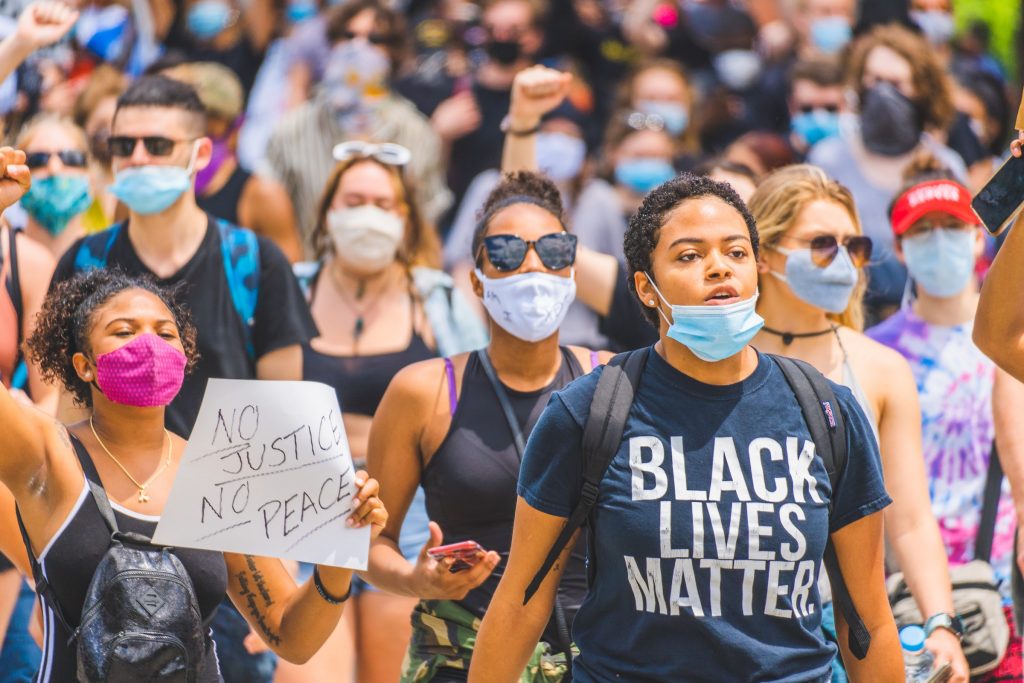
This was a horrendous crime by a relatively young police officer. Despite George Floyd’s pleads, despite that he was neutralised, officer Chauvin continued to kneel on the man’s neck. In the least, the officer demonstrated he did not give a flying fuck about the suspect’s life. He murdered a man he was supposed to take into custody over an accusation. None of us can justify that.
It does not matter that George Floyd had a criminal record.
It does not matter George Floyd may have committed a new crime.
It does not matter.
Innocent until proven guilty in a court of law.
The only thing that matters is that a white police officer had yet murdered another African American man.
Black Americans are two and a half times as likely as whites to be killed by the police
This brought on widespread protests. In cities and towns all over America – but also in Canada and in Europe – people came to the streets to show their contempt against police brutality. People were again given the explicit reason to shout “black lives matter” because yet another police officer had forgotten that. Black lives matter.
African Americans make up 13 per cent of the American population. However, black Americans are two and a half times as likely as white Americans to be killed by the police. It happens all the time that disproportionate force is used against African Americans.
For example, in the state of Utah, African Americans comprise just a little over one per cent of the population, but they account for ten per cent of police killings in the past seven years. In Minnesota, where George Floyd was murdered, African Americans are nearly four times likely to be killed by the police.
Of course, there is outrage. Of course, there are protests. Every single time a human being is unjustly killed, there should be outrage, there should be protests.
Sometimes police do not have a choice. When a suspect is threatening police officers or other people and there is no other means to protect both the officers and the public, you do not have another option. You shoot either to neutralise or to kill. Police officers’ training is clear. If the officer is being threatened by lethal force, then they will have to neutralise the threat because, if the police officer gets killed, there will be no one left to protect the others. And that is how it should be.
But George Floyd did not threaten anyone. He was lying on the ground, in handcuffs, and he was suffocated to death. Another needless death.
The sad thing is this has been going on way too long. It looks like nothing has really changed since the abolishment of slavery in terms of how African Americans are looked at by the white Americans. Yes, we are all saying we are not racist, we do not hate other races, but the truth of the matter is, African Americans still face disproportionate response when they are dealing with the law. Being pulled over just because you are an African American driving a car that the officer does not find a suitable vehicle for a black person is still a reality in 2020.
Representative John Lewis, who marched together with Martin Luther King and who is the last living speaker to have addressed the crowds at the Lincoln Memorial during the 1963 March on Washington, said of Floyd’s death in an interview with CBS This Morning on 5 June: “It was so painful. It made me cry. I kept saying to myself, ‘How many more? How many more young black men will be murdered? And the madness must stop.”
Lewis knows. He has been fighting for equality all his life. Lewis was brutally attacked by Alabama state troopers on 7 March 1965. If we are still at the same place in terms of human rights as we were in the 1960s, we as a species must be retarded.
Estonians still think it is okay to use the n-word
Reading some of my Estonian Facebook friends’ comments on the death of George Floyd and what ensued, I first found myself completely baffled. How can an intelligent person say things like, “how has a nigger, killed by a stupid US cop, become a national hero, even though he is a regular criminal…”? And comments along these lines have filled my Facebook feed for days now.
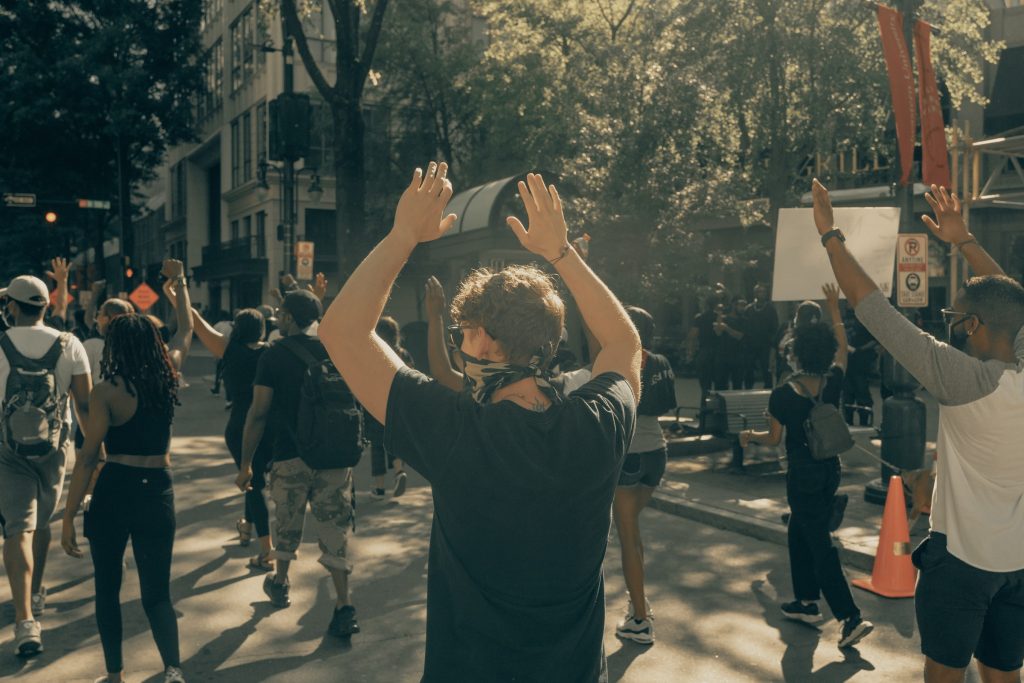
I believe it is partly because the Estonian people have never faced anything like this. They do not understand systemic racism that has existed in America for centuries as Estonia has always been fairly homogenous and mostly white. Racism, the literal hatred of other races, is a relatively new phenomenon in Estonia because, until recently, most Estonians hadn’t even seen a person of a different race.
That also fuels the current racism issues in Estonia. Other races than Caucasians have come to Estonia to study, work, live, marry – and many in the homogenous community are now seeing them as a threat. There is no systemic racism in Estonia because there is no such history; there is actual, visible racism in Estonia for the same reason.
People still, in 2020, think it is perfectly okay to say the word “neeger” (the n-word in Estonian) because the Estonian equivalent of the Oxford Dictionary doesn’t regard it offensive. But the fact that black people regard it offensive is not, evidently, an issue. Isn’t the entire point of not being a racist also not appearing as one? Maybe people should not use words that are only technically not derogative, but, in real life, are offensive towards the people they are used to describe?
To help the Estonian people understand the reason George Floyd became a national hero overnight – it was because he was yet another victim of systemic racism. When the system is rotten and bent towards treating all African Americans differently from white Americans, it is racist. Ask any black American, is the US a racist country, and they will reply in chorus: “Of course, America is racist.”
This is not to say that every police officer in the US is racist. A fish rots from the head down, as the saying goes. It is the job of police chiefs, mayors, governors and presidents to root out racism – to challenge and change the system. During the tenure of the last two Chicago police superintendents, there has not been a notable racist incident involving a Chicago Police Department officer. Both Eddie Johnson (superintendent 2016-2020) and David Brown (current) are African Americans.
People who commit crimes must be brought to justice
I am confident that most police officers are nice, decent human beings who are looking after the rest of us, the ones who did not have the chops to become cops. I am especially partial to the Chicago Police Department. I see the crime in Chicago. I see the Chicago police officers operating in extremely dangerous situations and the conditions for them are often unfair as they constantly face new rules of policing and, oftentimes, they don’t even know how to neutralise an obvious threat and not face charges of police brutality. In today’s world, there may sometimes be a very thin line in defending oneself and the public and being charged with brutality.
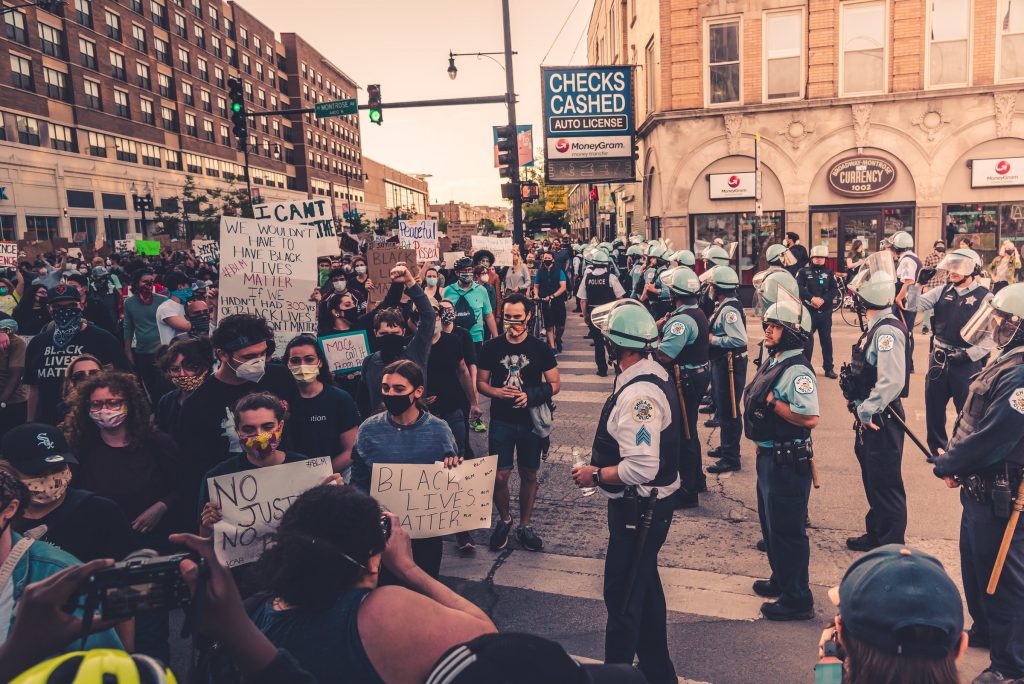
That is also why it was, for me, heart-breaking to see how, after the murder of George Floyd, police somehow became “legitimate targets” in the minds of many people. In New York, Molotov cocktails were thrown at occupied police vehicles. In Chicago, police vehicles were turned over and set in fire. I saw people on Facebook posting instructions on how to spot an undercover police officer. Seriously?
What do individual police officers of Chicago and New York City have to do with the murder of George Floyd? Most of them are decent women and men who have not committed any crimes, and yet, somehow, all police overnight became “bad”. This is another side of this crisis we are facing – we are suddenly dealing in absolutes. And there are no absolutes in life.
In one of the nights of protesting – and sadly, looting – in Chicago, I went out for a walk, wearing my Chicago Police hoodie. And a thought crossed my mind – tonight, it may actually not be very healthy for me to wear this, should I encounter a lynching mob. But I still went, and I still wore my hoodie, because it’s possible to be a fan of your city’s police department – the people who put their lives on the line to protect you – and condemn the systemic racism that plagues the enforcement of the law.
The bottom line is: the people who commit crimes – be it cops or civilians – need to be brought to justice. If a police officer commits a crime, they should be punished to the fullest extent of the law because they’re the people who have sworn to enforce it, sworn to protect others, sworn to keep us – regardless of race – safe, and failed to do so.
The opinions in this article are those of the author.
Cover: A Black Lives Matter protest in Washington, DC, on 1 June 2020. Photo by Koshu Kunii on Unsplash.

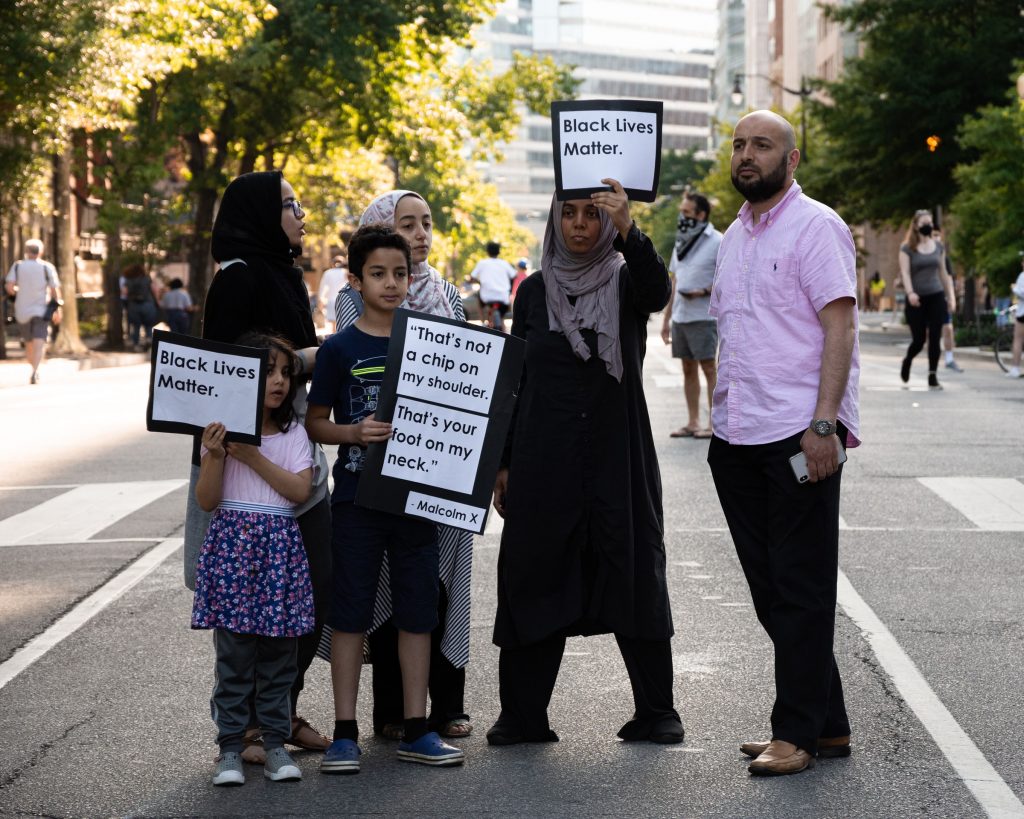
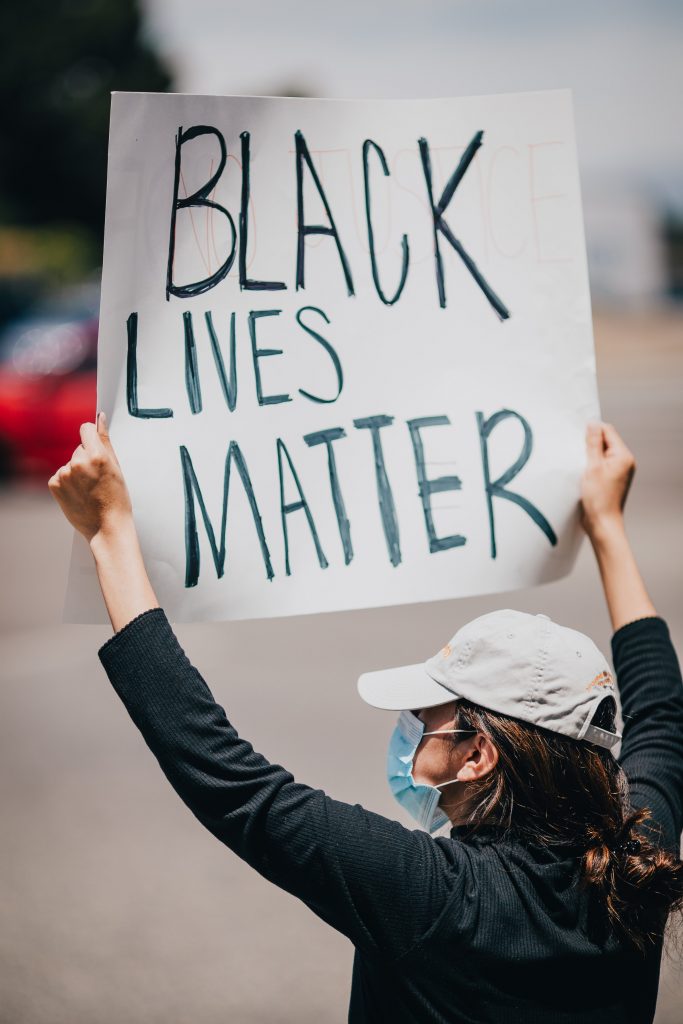
Might be a bit late to comment this, but I totally agree with this article. As a relatively young person myself I see racism in Estonia everywhere. I don`t even know what to do about the racist slurs sometimes just casually used in conversations, the silencing of people of color etc. Somehow estonians just have this idea that when it didn`t happen in Estonia, it does not matter or doesn´t affect us, which is so wrong in my opinion. And it´s so hard to explain to these people too, especially the older ones that it`s not only George Floyd who was killed beacause of his race, it`s thousands of others and IT`S NOT OKAY. It frustrates me so much how they try to justify what happened to George Floyd, but nobody deserves to die no matter who they are. Even the fact that this IS a problem shows that something is very wrong with estonians. I also think that now, when more and more people of color are coming to Estonia to study, work etc. we should talk about it more and make them feel safe.
So if a white person kills a black person, it’s called racism. If a black person kills a white person, it’s an unfortunate event. Seems legit